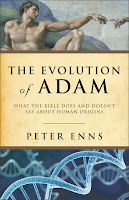 I have a lot of time for Peter Enns, a man who has endured much at the hands of apologetic nincompoops like Norman Geisler. Enns recognises that, if Christianity is to survive, it must lift itself out of the biblicist, literalist cesspit - natural home of American evangelicalism - and get to grips with reality. It's quite a mission.
I have a lot of time for Peter Enns, a man who has endured much at the hands of apologetic nincompoops like Norman Geisler. Enns recognises that, if Christianity is to survive, it must lift itself out of the biblicist, literalist cesspit - natural home of American evangelicalism - and get to grips with reality. It's quite a mission. In The Evolution of Adam Enns is blunt when it comes to the genesis of the biblical origin stories. We learn about the post-exilic dating of the Pentateuch and are introduced to Wellhausen. Those in the megachurch pews are going to be dragged past a raft of exhibits - from Atrahasis to Enuma Elish - that clearly demonstrate the human origins of Genesis stories. Was Adam an historical character? Of course not. In fact, Adam is a peripheral figure within the Old Testament. He pops up in Genesis then disappears without trace (the exception is a passing reference in 1 Chronicles 1:1).
In The Evolution of Adam Enns is blunt when it comes to the genesis of the biblical origin stories. We learn about the post-exilic dating of the Pentateuch and are introduced to Wellhausen. Those in the megachurch pews are going to be dragged past a raft of exhibits - from Atrahasis to Enuma Elish - that clearly demonstrate the human origins of Genesis stories. Was Adam an historical character? Of course not. In fact, Adam is a peripheral figure within the Old Testament. He pops up in Genesis then disappears without trace (the exception is a passing reference in 1 Chronicles 1:1).All this is great stuff, and a much needed corrective to the usual bumf that sits on the shelves in Christian bookstores. But, to be absolutely clear, Enns isn't a Bible debunker, but a committed Christian of evangelical hue. His reading of the Eden stories is, unsurprisingly, a theological one. The symbolism has (Enns maintains) everything to do with the "Israel's temple and the Sabbath rhythm," and nothing to do with the origin of humanity.
If all we had was the Hebrew Bible, this might not be such a camel-sized gnat to swallow. But for Christians there's Paul. Paul, for whom Adam is not just a peripheral figure, but a lynchpin in his theology. As in Adam all die, so in Christ will all be made alive. Jesus' death is contingent on Adam's sin; he is the "second Adam." For many [most?] Christians "it is theologically necessary for there to be some sort of Adam somewhere in human history who is personally responsible for allienating humanity from God."
It's a logic that's hard to refute if you've bought into the assumptions. Enns' task is to find a way through: Jesus as saviour minus an historical Adam; Genesis as scripture without a rejection of modern science and evolution. You've got to admire his fortitude.
Does he succeed or fail? In my view 'yes' to both. But make no mistake, this is a significant book and, perhaps, a harbinger of much needed change among twenty-first century evangelicals.
To be continued

"it is theologically necessary for there to be some sort of Adam somewhere in human history who is personally responsible for allienating humanity from God."
ReplyDeleteBut, there's not - so there. And, on top of that, a man couldn't possibly live 930 years. But, the fact that Genesis says he did means the writer of Genesis intended that the story of Adam to be taken as a literal and true genealogy - which it was in 1 Chronicles 1:1.
How many more centuries will Xians keep grasping at straws to keep their religion from drowning? How long will the Xian hatred for true history and science continue?